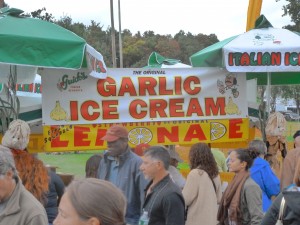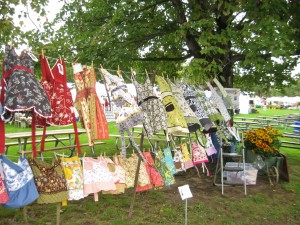For the past few days, I’ve been frenetically busy, but framed, as hard work often is, by quiet, melancholy moments – and in those moments I’ve heard this music. I worked the Hudson Valley Garlic Festival for Catskill Native Nursery this past weekend, and the carnival atmosphere and silly joy of these events is always built on a strange and appealing melancholy. For the most part, people are happy at these events – this one in particular, which is considered one of the best food festivals in the country – but as the thousands and thousands of faces stream by you can see the melancholy showing, like skin beneath a torn costume, in certain people. For whatever reason they remain untouched by the enthusiasm of others, and just glumly look at the happiness around them. In the buying and selling and consuming they can feel nothing relevant to their hearts – it is all tedium.
I know I would feel that way if I were a visitor to the festival, but working it is not quite the same – there is a melancholy there, but the inflection is different. As a customer at a festival you are just one of the millions, reduced to buying and consuming and making small talk – but the sellers are part of a special, select group, whose lives are different from everyone else’s. Setting up on Friday evening you are keenly aware – other people are finishing up for the week, but we’re just beginning.
The owners left the nursery around four, but I stayed on to help complete a very large sale, and it wasn’t until almost five that I was on the road for the festival. I had my special vendor tags but no one was at the gate, so I drove on in to our spot and we started setting up, unloading the truck, setting up the tables and tent, and soon enough we had tarps on everything to protect against the morning dew and off we went to dinner.
I stayed with a friend that night, and we talked as we always do about love and family and our hopes for our lives, and I said goodbye to him in the evening, as I would be up at five the next morning to get to work. Driving north on the empty Thruway I saw the transition to morning from night. The entire valley was swathed in mist, but I could see the mountains up above, gold in the first light, in an atmosphere of purity and clarity. Watching them as I approached Saugerties I drove right past the exit, and got to see even more of the morning as I went to Catskill and then back down to Saugerties. As happens almost every day here, I felt so lucky just to be there.
I parked by the festival gate and walked in, and again no one was at the gate. In the booths the vendors were tinkering with their wares, each in their own separate worlds. I knew several of them by face from the previous evening, but we didn’t even try to learn each other’s names – we knew that the names would be irrelevant and forgotten by the next night. They had no value. All that mattered was that we would help each other if help was needed – “watch my booth for a minute while I go to the bathroom would ya?” – and that we had someone nearby who was like us, so we could complain about the festival-goers, how they weren’t buying or bought the dumb stuff, or make comments about the weather, or talk about how the season was or how things were back home. And we did all these things, without any names.
There are some people who live off festivals, going from place to place all over the country, and they are usually the different people, who don’t really fit into normal jobs, and who don’t mind working weekends and travelling all the time and dealing with all the problems of running a tiny business and having no money in exchange for the freedom of it all. Some of them have all the hardness of travelled gypsies and artsy people who have learned the discipline of business – but then again, there are others who are just starting, and for whom it’s all new. But at the garlic festival there are also a lot of farmers, whose concerns are very different. Oddly enough, they’re not normal people either, but only because they’re so traditional – intact families, little blond children running around, they talk about the harvest and the weather.
You can feel apprehension coming from some booths – what if no one shows up? What if no one wants what I have this year? – and jaded fatigue from others as the morning setup is completed and for a brief spell there is nothing to do. Then the gates open and people start to arrive – but slowly, and the apprehension gets worse. But for us the business got brisk soon enough, and then it was all work. The weather started foggy, but the fog burned off by ten or so and it became one of the most beautiful days of the year. And the crowds turned out. It is said that 50,000 people came to the festival this year, an all-time record. The place was packed, and we sold and sold and sold. I had my “John Kuhner for Town Council” button on, and I talked to people about just about everything – life in the Catskills, the beauty of nature, politics, literature, but mostly it was just about our products and the conversation was the same all through the day. I got a little break for lunch and I walked over the fairgrounds, buying some garlic for friends and looking over the crowds.
 It’s hard for me to explain how I feel when I look at these crowds of people – I have a love for it all which I can’t really find good reason for. I love it all – the young beautiful couples, the old-lady friends, the families with kids, the festival organizers driving around importantly in golf carts, the lines forming around the best booths, the desperate look of the sellers no one buys from, the people complaining about the sun or the picnic tables or the crowds or enthusing about the food or the weather or the thing they just bought. I love watching people look over things they like saying, “Don’t you think so-and-so would love one?” I love all the clothing, the women in their autumn blue jeans, the hipsters in their plastic-rimmed glasses, the t-shirts with all kinds of slogans on them, the people wearing garlic costumes. I love the way experienced festival-goers tell the newbies about this or that, I love the way conversations start between strangers, I love the hugs of old friends who have just run into each other. I love working hard and being busy for hours on end and being surrounded by all these thousands of people. Epictetus has a long quotation about life being like a festival (quoted below), and he praises the life of merely contemplating the festival, though for me this is not enough. I want to be part of the festival – to buy something there, to work for its prosperous outcome, to see friends there and make other new ones.
It’s hard for me to explain how I feel when I look at these crowds of people – I have a love for it all which I can’t really find good reason for. I love it all – the young beautiful couples, the old-lady friends, the families with kids, the festival organizers driving around importantly in golf carts, the lines forming around the best booths, the desperate look of the sellers no one buys from, the people complaining about the sun or the picnic tables or the crowds or enthusing about the food or the weather or the thing they just bought. I love watching people look over things they like saying, “Don’t you think so-and-so would love one?” I love all the clothing, the women in their autumn blue jeans, the hipsters in their plastic-rimmed glasses, the t-shirts with all kinds of slogans on them, the people wearing garlic costumes. I love the way experienced festival-goers tell the newbies about this or that, I love the way conversations start between strangers, I love the hugs of old friends who have just run into each other. I love working hard and being busy for hours on end and being surrounded by all these thousands of people. Epictetus has a long quotation about life being like a festival (quoted below), and he praises the life of merely contemplating the festival, though for me this is not enough. I want to be part of the festival – to buy something there, to work for its prosperous outcome, to see friends there and make other new ones.
I went to a party Saturday night, and got about three hours of sleep before getting up at five again and heading back to the festival, and working all day Sunday. And then it is all over, the business is done, and the quiet melancholy shows through again – the tents are struck, the trucks are loaded up and everyone goes, as little bits of garbage stir in the wind. I think one of the reasons why it strikes me so much is because a festival is such a picture of mortality – it all comes into being, flourishes, and then comes to an end, and all so quickly. You feel the little loss, as another part of the world transitions from something planned to something happening to something done and gone forever, in just two days. The crowds go away and all of a sudden you are alone. I returned to Wildcat Mountain, wrote a bit in the evening, lit a candle before my icon in religious gratitude and fervent desire – the condition I return to whenever I am happy – and went to bed alone.
The Greek philospher Epictetus wrote memorably about fairs:
Our situation can be compared to what happens at a public festival. Cattle and oxen are brought there to be sold, and the greatest number of men come either to buy or sell; but there are a few who come only to look at the fair, and inquire how it is carried on, and why, and who set it up, and for what purpose; thus, in the fair of the world, some, like cattle, trouble themselves about nothing but fodder. For as to all you who busy yourselves about possessions and farms and slaves and public posts, these things are nothing else but mere fodder. Few are the men who attend the fair because they are fond of looking on and considering, ‘What, then, is the world? Who governs it? Has it no governor? Yet how is it possible, when neither a city nor a house can remain ever so short a time without some one to govern and take care of it, that this vast and beautiful structure should be regulated in such an orderly manner without plan and by mere chance? So there is someone who governs it. What sort of being is he? And how does he govern? And what are we who have been created by him, and what task were we created to fulfil? Have we some connection and relation with him; or none? Such are the thoughts aroused in these few; and thenceforth they have leisure for this alone, to investigate the festival of life before they depart.

One Comment